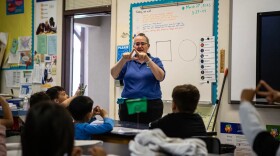NPR Ed is updating some of the top stories we've been following in 2014.
The 650,000 students in the Los Angeles Unified School District expected to be tapping and scrolling on their very own iPads by now, halfway through the school year.
But the largest school technology expansion in the country became a magnet for controversy and was a factor in the resignation of Superintendent John Deasy in October. He had made technology a centerpiece of his efforts to close the persistent academic achievement gap between disadvantaged students and their more privileged peers.
Eighty percent of LA Unified's student body is low-income and only about half read at grade level.
"So the pace needs to be quick, and we make no apologies for that," Deasy told KPCC in 2012.
But in the last year, the largest school technology expansion in the country stalled. The iPads arrived in schools before WiFi, officials didn't include keyboards with the tablets and students found ways to bypass online protection software and access Facebook and Twitter.
Then this month, in a surprising move, the FBI seized 20 boxes of documents related to a $500 million iPad contract with Apple and Pearson, the company that provided the software loaded on many of the iPads. The investigation is housed in the agency's office of public corruption.
In August, KPCC published emails between Deasy and executives at Apple and Pearson. The early email discussions resembled LA Unified's later bidding requirements, which included such details as a 9.7-inch screen — the size of the original iPad.
"I believe we would have to make sure that your bid is the lowest one," Jaime Aquino, a former top district staffer, wrote to executives at Pearson in one of the email exchanges.
Both Aquino and Deasy have said the selection process was fair.
Three days after KPCC's report, Deasy canceled the contract with Apple. In October, less than two months later, he announced his resignation.
A federal grand jury has convened, but prosecutors haven't revealed the individuals targeted or possible charges in their investigation.
The school board has purchased 112,500 iPads so far. After a board member fought for a laptop option, they also bought 8,394 Google Chromebooks.
A survey released in September found most students skipped over Pearson's software in favor of playing games and watching videos in class.
Student reviews of the iPad have been mixed.
Aiden Lafreniere, a junior at Valley Academy of Arts and Sciences in Granada Hills, said having a tablet makes it easier for her to stay in touch with her teachers.
"We have a place we can constantly go and check our instructions," she said. "There isn't that factor of losing work when you turn it in because of massive amounts of paperwork."
Jesus Vargas was less enthusiastic when he test-drove a district iPad in October 2013.
Then a senior at USC Math, Science and Technology High School, Vargas coded his own apps. He complained Pearson's learning software wasn't challenging, and the iPad wasn't adequately versatile.
"It's very similar to the interface of an iPod, which I have not used in a long time," Vargas said.
It's not clear when the rest of the district's students will receive their own tablets or laptops.
Ramon Cortines, LA Unified's new superintendent, plans to put out a call for new bids in 2015.
When that happens, Marc Zev, an parent in the district and a software developer, hopes the district will base the new purchase requirements on what works best for students and teachers.
So far, most of the devices were purchased without input from those who will be using them.
"I think the board really blew it," Zev said. "They just didn't think it through."
Annie Gilbertson @AnnieGilbertson covers education for KPCC.
Copyright 2014 Southern California Public Radio. To see more, visit http://www.kpcc.org/.






